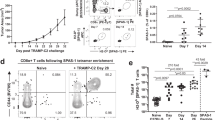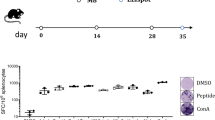Abstract
Gene therapy for prostate cancer may be realized through transduction of whole genes, such as PSA or PSMA, into immunotherapeutic dendritic cells (DCs). An oncoretroviral vector encoding human PSMA and a bicistronic oncoretroviral vector encoding human PSA and cell surface CD25 cDNAs were constructed. Remarkably, transfer of PSA/CD25 or PSMA cDNA during murine hematopoietic cell differentiation into DCs occurred with approximately 80% efficiency. In vitro, transduced DCs retained allostimulatory function and primed syngeneic T cells for tumor antigen-specific IFN-γ secretion. In test experiments designed to elucidate mechanisms in vivo, syngeneic recipients of transduced DCs had increased anti-human PSA antibody titers and tumor-specific CD8+ T cell IFN-γ secretion with no detectable immune response to CD25. Gene-modified DC recipients had increased protection from specific tumor challenge for at least 18 weeks post-vaccination. DC vaccination also protected both male and female recipients. Gene-modified DC vaccination mediated regression of established, specific gene-expressing, TRAMP-C1 prostate cancer cell tumors. These findings indicate that antibody and cellular responses generated through PSA and PSMA gene transfer into DC yielded protective immunity, thereby providing further preclinical support for the implementation of immuno-gene therapy approaches for prostate cancer.
This is a preview of subscription content, access via your institution
Access options
Subscribe to this journal
Receive 12 print issues and online access
$259.00 per year
only $21.58 per issue
Buy this article
- Purchase on Springer Link
- Instant access to full article PDF
Prices may be subject to local taxes which are calculated during checkout






Similar content being viewed by others
References
Vesalainen S, Lipponen P, Talja M, Syrjanen K . Histological grade, perineural infiltration, tumour-infiltrating lymphocytes and apoptosis as determinants of long-term prognosis in prostatic adenocarcinoma. Eur J Cancer. 1994;30A:1797–1803.
Wei C, Storozynsky E, McAdam AJ, et al. Expression of human prostate-specific antigen (PSA) in a mouse tumor cell line reduces tumorigenicity and elicits PSA-specific cytotoxic T lymphocytes. Cancer Immunol Immunother. 1996;42:362–368.
Liu KJ, Chatta GS, Twardzik DR, et al. Identification of rat prostatic steroid-binding protein as a target antigen of experimental auto-immune prostatitis: implications for prostate cancer therapy. J Immunol. 1997;159:472–480.
Banchereau J, Steinman RM . Dendritic cells and the control of immunity. Nature. 1998;392:245–252.
Steinman RM . The dendritic cell system and its role in immunogenicity. Ann Rev Immunol. 1991;9:271–296.
Aalamian M, Pirtskhalaishvili G, Nunez A, et al. Human prostate cancer regulates generation and maturation of monocyte-derived dendritic cells. Prostate. 2001;46:68–75.
Pirtskhalaishvili G, Shurin GV, Gambotto A, et al. Transduction of dendritic cells with Bcl-xL increases their resistance to prostate cancer-induced apoptosis and antitumor effect in mice. J Immunol. 2000;165:1956–1964.
Troy A, Davidson P, Atkinson C, Hart D . Phenotypic characterisation of the dendritic cell infiltrate in prostate cancer. J Urol. 1998;160:214–219.
Takenaka T, Murray GJ, Qin G, et al. Long-term enzyme correction and lipid reduction in multiple organs of primary and secondary transplanted Fabry mice receiving transduced bone marrow cells. Proc Natl Acad Sci USA. 2000;97:7515–7520.
Qin G, Takenaka T, Telsh K, et al. Pre-selective gene therapy for Fabry disease. Proc Natl Acad Sci USA. 2001;98:3428–3433.
Henderson RA, Nimgoankar MT, Watkins SC, et al. Human dendritic cells genetically engineered to express high levels of the human epithelial tumor antigen mucin (MUC-1). Cancer Res. 1996;56:3763–3770.
Reeves ME, Royal RE, Lam JS, et al. Retroviral transduction of human dendritic cells with a tumor-associated antigen gene. Cancer Res. 1996;56:5672–5677.
Song ES, Lee V, Surh CD, et al. Antigen presentation in retroviral vector-mediated gene transfer in vivo. Proc Natl Acad Sci USA. 1997;94:1943–1948.
Specht JM, Wang G, Do MT, et al. Dendritic cells retrovirally transduced with a model antigen gene are therapeutically effective against established pulmonary metastases. J Exp Med. 1997;186:1213–1221.
Parajuli P, Mosley RL, Pisarev V, et al. Flt3 ligand and granulocyte-macrophage colony-stimulating factor preferentially expand and stimulate different dendritic and T cell subsets. Exp Hematol. 2001;29:1185–1193.
Ward AM, Catto JWF, Hamdy FC . Prostate specific antigen: biology, biochemistry and available commercial assays. Ann Clin Biochem. 2001;38:633–651.
Xue BH, Zhang Y, Sosman JA, Peace DJ . Induction of human cytotoxic T lymphocytes specific for prostate-specific antigen. Prostate. 1997;30:73–78.
Kim JJ, Trivedi NN, Wilson DM, et al. Molecular and immunological analysis of genetic prostate specific antigen (PSA) vaccine. Oncogene. 1998;17:3125–3135.
Heiser A, Maurice MA, Yancey DR, et al. Induction of polyclonal prostate cancer-specific CTL using dendritic cells transfected with amplified tumor RNA. J Immunol. 2001;166:2953–2960.
Gregorakis AK, Holmes EH, Murphy GP . Prostate-specific membrane antigen: current and future utility. Sem Urol Oncol. 1998;16:2–12.
Tasch J, Gong M, Sadelain M, Heston WDW . A unique folate hydrolase, prostate-specific membrane antigen (PSMA): a target for immunotherapy? Crit Rev Immunol. 2001;21:249–261.
Kim J, Palmer, JL, Finn L, et al. The pattern of serum markers in androgen-independent adenocarcinoma of the prostate. Urologic Oncol. 2000;5:97–103.
Chang SS, Reuter VE, Heston WD, et al. Five different anti-prostate-specific membrane antigen (PSMA) antibodies confirm PSMA expression in tumor-associated neovasculature. Cancer Res. 1999;59:3192–3198.
Mincheff M, Tchakarov S, Zoubak S, et al. Naked DNA and adenoviral immunizations for immunotherapy of prostate cancer: a phase I/II clinical trial. Eur Urol. 2000;38:208–217.
Henttu P, Vihko P . cDNA coding for the entire human prostate specific antigen shows high homologies to the human tissue kallikrein genes. Biochem Biophys Res Commun. 1989;160:903–910.
Takenaka T, Qin G, Brady RO, Medin JA . Circulating α-galactosidase A derived from transduced bone marrow cells: relevance to gene therapy for Fabry disease. Hum Gene Ther. 1999;10:1931–1939.
Gehring U, Mohit B, Tomkins GM . Glucocorticoid action on hybrid clones derived from cultured myeloma and lymphoma cell lines. Proc Natl Acad Sci USA. 1972;69:3124–3127.
Foster BA, Gingrich JR, Kwon ED, et al. Characterization of prostatic epithelial cell lines derived from transgenic adenocarconoma of the mouse prostate (TRAMP) model. Cancer Res. 1997;57:3325–3330.
Garlie NK, Lefever AV, Siebenlist RE, et al. T cells co-activated with immobilized anti-CD3 and anti-CD28 as potential immunotherapy for cancer. J Immunother. 1999;22:336–345.
Olsson AY, Lundwall A . Organization and evolution of the glandular kallikrein locus in Mus musculus. Biochem Biophys Res Comm. 2002;299:305–311.
Lapointe R, Royal RE, Reeves ME, et al. Retrovirally transduced human dendritic cells can generate T cells recognizing multiple MHC Class I and Class II epitopes from the melanoma antigen glycoprotein 100. J Immunol. 2001;167:4758–4764.
Fan L, Owen JS, and Dickson, G . Construction and characterization of polycistronic retrovirus vectors for sustained and high-level co-expression of apolipoprotein A-I and lecithin-cholesterol acyltransferase. Atherosclerosis. 1999;147:139–145.
Nestle FO, Alijagic S, Gilliet M, et al. Vaccination of melanoma patients with peptide-or tumor lysate-pulsed dendritic cells. Nat Med. 1998;4:328–332.
Hsu FJ, Benike C, Fagnoni F, et al. Vaccination of patients with B-cell lymphoma using autologous antigen-pulsed dendritic cells. Nat Med. 1996;2:52–58.
Tjoa BA, Simmons SJ, Elgamal A, et al. Follow-up evaluation of a phase II prostate cancer vaccine trial. Prostate. 1999;40:125–129.
Huang YM, Yang JS, Xu LY, et al. Autoantigen-pulsed dendritic cells induce tolerance to experimental allergic encephalomyelitis (EAE) in Lewis rats. Clin Exp Immunol. 2000;122:437–444.
Nouri-Shirazi M, Banchereau J, Bell D, et al. Dendritic cells capture killed tumor cells and present their antigens to elicit tumor-specific immune responses. J Immunol. 2000;165:3797–3803.
Medin JA, Karlsson S . Viral vectors for gene therapy of hematopoietic cells. Immunotech. 1997;3:3–19.
Jonuleit H, Tuting T, Steitz J, et al. Efficient transduction of mature CD83+ dendritic cells using recombinant adenovirus suppressed T cell stimulatory capacity. Gene Ther. 2000;7:249–254.
Dyall J, Latouche JB, Schnell S, Sadelain M . Lentivirus-transduced human monocyte-derived dendritic cells efficiently stimulate antigen-specific cytotoxic T lymphocytes. Blood. 2001;97:114–121.
Acknowledgements
We thank Christopher Siatskas (OCI, UHN) for helpful discussions and critical reading of the manuscript along with JingMei Liu (UIC), Gangjian Qin (UIC), and John Campbell (OCI, UHN) for experimental assistance. This study was supported in part by the US Department of Defense Grant #DAMD17-00-1-0083 (to JAM).
Author information
Authors and Affiliations
Corresponding author
Rights and permissions
About this article
Cite this article
Medin, J., Liang, SB., Hou, JS. et al. Efficient transfer of PSA and PSMA cDNAs into DCs generates antibody and T cell antitumor responses in vivo. Cancer Gene Ther 12, 540–551 (2005). https://doi.org/10.1038/sj.cgt.7700810
Received:
Published:
Issue Date:
DOI: https://doi.org/10.1038/sj.cgt.7700810
Keywords
This article is cited by
-
Immunostimulatory early phenotype of tumor-associated macrophages does not predict tumor growth outcome in an HLA-DR mouse model of prostate cancer
Cancer Immunology, Immunotherapy (2015)
-
An Artificial PAP Gene Breaks Self-tolerance and Promotes Tumor Regression in the TRAMP Model for Prostate Carcinoma
Molecular Therapy (2012)
-
Cancer immunotherapy: a paradigm shift for prostate cancer treatment
Nature Reviews Urology (2012)
-
Optimised electroporation mediated DNA vaccination for treatment of prostate cancer
Genetic Vaccines and Therapy (2010)
-
Retrovirally transduced murine T lymphocytes expressing FasL mediate effective killing of prostate cancer cells
Cancer Gene Therapy (2009)



